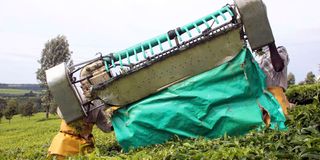Embrace mechanised tea harvesting for sustainability

Tea harvesting using a tea plucking machine in Kericho County.
What you need to know:
- The seasonal nature of tea harvesting leads to labour migration, leaving plantations understaffed.
- Mechanisation can lead to 20-30 per cent reduction in the number of labourers required for harvesting.
As the global demand for tea rises, so does the need for sustainable growth and innovation in the vital sector. But on Kenya’s fields that produce some of the finest teas, the prospect of automation has ignited debate on job security, communities’ well-being and the industry’s future.
Kenya ranks among the top tea producers. The industry, deeply rooted in our heritage, is a significant contributor to the economy, providing employment to hundreds of thousands of people.
But the global tea industry is evolving rapidly amid shifting consumer preferences, market dynamics and sustainability concerns. To maintain our competitive edge and foster sustainable growth, we must adapt.
Mechanisation brings precision and efficiency to the tea harvesting process. The utilisation of modern machinery ensures tea leaves are plucked at their optimal maturity, resulting in higher-quality teas. The consistency so achieved elevates our teas to meet international standards consistently.
Steady and reliable workforce
Labour shortages is a pressing challenge to the sector. The seasonal nature of tea harvesting leads to labour migration, leaving plantations understaffed. Mechanisation can bridge this gap by ensuring a steady and reliable workforce. Contrary to common belief, it does not spell doom for employment in tea-growing regions; it transforms, rather than eradicate, the landscape. While some traditional roles may become obsolete, the overall impact is positive.
Mechanisation can lead to 20-30 per cent reduction in the number of labourers required for harvesting. But it can also create up to 50 per cent more jobs in the machinery operation, maintenance and manufacturing sectors.
Skilled machine operators earn competitive wages, improving the economic status of the workforce. Moreover, the tea industry can play a pivotal role in retraining and upskilling displaced workers, ensuring a smooth transition.
Embracing mechanised tea harvesting is not a one-size-fits-all solution. It must be implemented with a keen eye on sustainability and the well-being of our communities. Investing in skill development programmes for our workforce is paramount.
Ethical mechanisation
We should establish training centres and partnerships with educational institutions to ensure that our people are equipped with the skills needed for a technologically advanced tea sector.
Promote ethical mechanisation by emphasizing responsible practices, ensuring that machines do not replace workers but augment their abilities. Collaborate with industry stakeholders to establish guidelines that prioritise worker welfare.
But while we modernise our tea harvesting, let us also focus on diversifying our product offerings. Specialty teas, herbal infusions and organic options have gained popularity globally. Diversification not only opens new markets but also provides opportunities for employment and economic growth.
Mechanisation is a path to prosperity. In a world where the demand for tea continues to rise, Kenya’s tea sector can maintain its leadership position by marrying tradition with innovation. The journey may have challenges but is worth embarking on for the industry and the communities it supports.
Mr Moseti is an IT consultant. [email protected]





